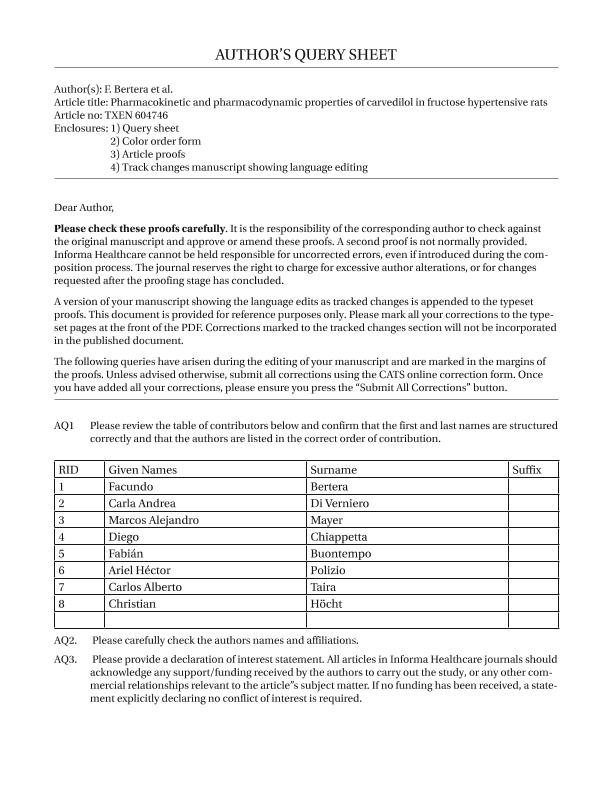Artículo
Pharmacokinetic and pharmacodynamic properties of carvedilol in fructose hypertensive rats
Bertera, Facundo; Di Verniero, Carla Andrea; Mayer, Marcos Alejandro ; Chiappetta, Diego Andrés
; Chiappetta, Diego Andrés ; Buontempo, Fabián; Polizio, Ariel Héctor
; Buontempo, Fabián; Polizio, Ariel Héctor ; Taira, Carlos Alberto
; Taira, Carlos Alberto ; Höcht, Christian
; Höcht, Christian
 ; Chiappetta, Diego Andrés
; Chiappetta, Diego Andrés ; Buontempo, Fabián; Polizio, Ariel Héctor
; Buontempo, Fabián; Polizio, Ariel Héctor ; Taira, Carlos Alberto
; Taira, Carlos Alberto ; Höcht, Christian
; Höcht, Christian
Fecha de publicación:
09/2011
Editorial:
Taylor & Francis
Revista:
Xenobiotica
ISSN:
0049-8254
e-ISSN:
1366-5928
Idioma:
Inglés
Tipo de recurso:
Artículo publicado
Clasificación temática:
Resumen
The cardiovascular effects and mechanism of antihypertensive response of carvedilol were assessed in fructose fed rats using pharmacokinetic–pharmacodynamic (PK-PD) modelling. Male Sprague Dowley rats were randomly divided into two groups: control rats received water for 6 weeks while fructose rats received fructose solution (10 %w/v) during 6 weeks. Effects of carvedilol (1-3 mg/kg i.v.) on blood pressure, heart rate and blood pressure variability were recorded. Enantioselective carvedilol plasma pharmacokinetics was studied by traditional blood sampling. Relationship between carvedilol concentrations and their hypotensive and bradycardic effects was established by PK-PD modelling. Vascular sympatholytic activity of carvedilol was assessed by estimation of drug effects on low frequency blood pressure variability using spectral analysis. A greater volume of distribution and clearance of S-carvedilol compared to R-enantiomer was found in both experimental groups. Fructose feeding increased volume of distribution of both enantiomers. Although PK-PD properties of S-carvedilol chronotropic effect were not altered in fructose rats, hypertensive rats showed greater efficacy to the carvedilol hypotensive response after administration of the higher dose. A similar potency of carvedilol to inhibit sympathetic vascular activity was found in fructose rats. Carvedilol showed enantioselective non-linear pharmacokinetic properties in both groups with increased distribution in fructose fed rats compared with normotensive animals. An enhanced hypotensive activity of carvedilol was found in fructose rats compared with control rats, which is not related to enhanced sympatholytic activity. Therefore, pleiotropic effects of carvedilol, such as antioxidant activity, seem to contribute to its enhanced antihypertensive activity in this experimental model of metabolic syndrome.
Archivos asociados
Licencia
Identificadores
Colecciones
Articulos(OCA HOUSSAY)
Articulos de OFICINA DE COORDINACION ADMINISTRATIVA HOUSSAY
Articulos de OFICINA DE COORDINACION ADMINISTRATIVA HOUSSAY
Citación
Bertera, Facundo; Di Verniero, Carla Andrea; Mayer, Marcos Alejandro; Chiappetta, Diego Andrés; Buontempo, Fabián; et al.; Pharmacokinetic and pharmacodynamic properties of carvedilol in fructose hypertensive rats; Taylor & Francis; Xenobiotica; 42; 2; 9-2011; 206-219
Compartir
Altmétricas



